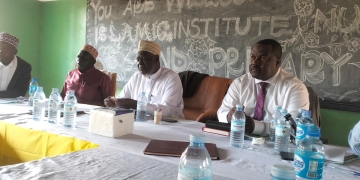The recent study by Action Aid International entitled “How the Finance Flows: Corporate capture of public finance fueling the climate crisis in the Global South” has revealed that in the Global South, the same industries that are fueling the climate crisis are also draining public funds from the same governments through various ways.

At the launch of this report on Tuesday, various stakeholders called upon Government, Companies and other concerned parties all over the world expressed an urgent need for all governments to speed up the transition to green, resilient, democratic and people-led climate solutions for food and energy, such as renewable energy and agro ecology.
On addressing participants at the virtual launch of the report, Sarah Kabir, the Country Director, Action Aid Bangladesh noted that it is well known that all Global North countries have money to finance Climate change activities but in most cases , it ends up being channeled into wrong direction in the wrong communities.
“There is a lot of Industrial agriculture in Zimbabwe with too much use of agrochemical fertilizers and hybrid seeds. There is a need increase financing towards Climate change solutions like Agro ecology and renewable energy.” Joy Mabenge, Country Director, Action Aid Zimbabwe
Teresa Anderson , Global lead on Climate Justice, Action Aid International, asked the countries of Global South to stand up to the industries that are draining their finances and wrecking the environment.
“Meanwhile Climate finance support from wealthy polluting countries to cope with impacts and transition to green pathways has been minimal and insufficient to trigger change. Many of the organizations benefiting from these subsidies are themselves from Global North and always pay minimal taxes to Global south countries.”
More about the report
The report reveals how the fossil fuel and industrial agriculture sectors are squeezing climate-hit countries for hundreds of billions of dollars in public subsidies every year.
Corporate capture of public finance means that each year the climate-destructive fossil fuel and industrial agriculture sectors are getting US$ 677 billion in subsidies in the Global South. This amount could pay for primary school education for all sub-Saharan African children more than 3.5 times over.
The Industrial agriculture sector in the Global South has been receiving an annual average of US$ 238 billion in public subsidies every year, in the years between 2016 (when the Paris Agreement was signed) and 2021 (the most recent year with available data). In 2021 this figure came to US$ 276.4 billion.
The fossil fuel sector has been receiving an even more shocking annual average of US$ 438.6 billion a year in publicly financed subsidies from Global South countries between 2016 and 2023.
Fossil fuel subsidies have steadily risen over this period, and in 2023 this came to US$ 495.3 billion.
Climate finance grants from the Global North for climate-hit countries still only come to 1/20th the amount of public financing going to the fossil fuel and industrial agriculture sectors in the Global South.
The lack of real climate finance for solutions in the Global South means that public subsidies for the fossil fuel sector are 40 times more than public investments in renewable energy.
These numbers illustrate a deeply worrying pattern about the state of the planet’s finance flows, and how corporate capture of public finance is actively undermining the interests of climate-vulnerable countries, as well as global climate commitments.
There is an urgent need for all governments to speed up the transition to green, resilient, democratic and people-led climate solutions for food and energy, such as renewable energy and agro ecology. For Global south countries already experiencing the devastating consequences of climate change, the need for global transition is all the more urgent.
But the fossil fuel and industrial agriculture sectors are exerting an iron grip on the energy and agriculture policies and budgets of the same Global South countries that are bearing the worse climate impacts caused by these industries.
This corporate capture of public finance is locking countries of the Global South into harmful development pathways that drive land grabs, pollute communities, undermine food sovereignty, threaten human rights, devastate ecosystems and compound the injustice of climate change.
While the use of public subsidies to strengthen communities’ access to food and energy can often be motivated in the public interest, the unquestioning public financing of climate-destructive fossil fuel and industrial agribusiness instead of people-centered climate solutions for food and energy, is short-sighted and self-defeating.
The accumulating planet-heating greenhouse gases, ecological destruction and land grabs caused by these industries threaten the climate stability, food security, livelihoods, access to water and rights of people particularly of those already marginalized and living in poverty – in the immediate and mid-term, and are relentlessly pushing our planet to the brink of survival. It is therefore not in the interests of people or nations to use scarce public funds to fuel addiction to the industries that are doing them the most harm.

Recommendations
Public finance: All countries across Global South and North must accelerate the shift away from climate-destructive fossil fuel and industrial agriculture, towards people-led climate solutions that safeguard people’s rights, deliver accountability, and ensure public participation in decision-making processes.
In addition to corporate regulation, climate-centered energy and agriculture policies, and just transition approaches, public finance must be redirected away from the causes of climate change towards the real solutions. Priority areas for public financing must include the scaling up of decentralized renewable energy systems to provide energy access, and gender-responsive extension services that offer training in agro ecology and support for marketing.
Climate finance: Wealthy countries must provide trillions of dollars in grant-based climate finance each year to Global South countries on the front lines of the climate crisis, including by agreeing to an ambitious new climate finance goal at COP29 that reflects this scale.
Private finance: Climate transition plans consistent with a 1.5°C climate goal should be mandatory for banks, ending the financing of fossil fuels and harmful industrial agriculture expansion. Governments must regulate the banking and finance sectors to end destructive financing, with regulations that set minimum standards for human rights, social and environmental frameworks.
Finance system transformation: Wealthy countries and international financial institutions must implement conditionality-free debt cancellation for countries on the front lines of the climate crisis that need it, and support bold and fair new global tax rules through agreeing a strong UN framework convention on Tax.










